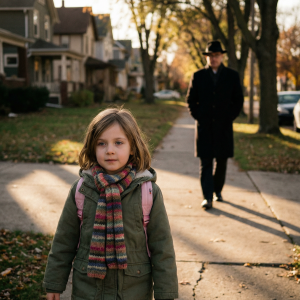The Educator I Failed to See
My name is Sofia Chen, and at thirty-two, I thought I had life figured out. As a digital marketing manager at a prominent Seattle firm, I crafted campaigns that drove millions in revenue, managed high-profile accounts, and lived in a sleek downtown apartment that screamed success. What I couldn’t figure out was why I felt so hollow inside, especially when I thought about my mother.
Elena Chen had dedicated thirty-five years of her life to teaching high school mathematics at Roosevelt High, the same inner-city school where she’d begun her career straight from graduate school. She taught everything from basic algebra to AP calculus, mentored the academic decathlon team, and ran a weekend tutoring program for struggling students—all while raising me alone after my father abandoned us when I was seven.
Growing up, I cringed at nearly everything about her existence. The secondhand blazers she wore while other mothers sported boutique outfits. The ancient Toyota Corolla that wheezed and rattled in the school pickup line. The way she’d speak Mandarin to grocery clerks, oblivious to the irritated glances from customers who seemed offended by foreign languages in their space.
But what mortified me most was her career choice. While my classmates’ parents worked in gleaming corporate towers and medical centers, my mother spent her days trying to teach quadratic equations to teenagers who’d rather be anywhere else. She’d return home drained each night, lugging canvas bags stuffed with tests to grade and sharing stories about students who seemed more invested in disrupting class than learning mathematics.
“Why don’t you find something that actually pays decent money?” I’d demand during high school. “You could work for an engineering firm or teach at a private school where people appreciate education.”
“Sweetheart,” she’d respond with endless patience, “these children need someone who sees their potential. Sometimes I’m the only person in their world who believes they can achieve great things.”
I’d dismiss this as foolish optimism. Elena was squandering her brilliant mind on ungrateful kids while we scraped by on a teacher’s meager income, clipping coupons and shopping at thrift stores.
The Call That Changed Everything
The phone call that shattered my carefully constructed world came on a rainy Tuesday morning in October.
I was deep in analytics for a luxury brand campaign when my phone buzzed. The caller ID displayed “Roosevelt High School,” which immediately sent panic through my chest. Elena never called during school hours unless something was terribly wrong.
“Ms. Chen? This is Vice Principal Washington from Roosevelt High. I’m calling regarding your mother, Elena Chen.”
His grave tone confirmed my worst fears. “What happened? Is she okay?”
“I’m sorry to inform you that your mother collapsed during her third period class this morning. Paramedics transported her to Harborview Medical Center. Initial reports suggest a stroke.”
The words seemed to come from a great distance, like hearing dialogue through water. Elena was only fifty-six, exercised regularly, and maintained a healthy diet despite our financial constraints. Strokes happened to other people’s mothers—not to women who walked to work every morning and packed homemade lunches.
I drove to the hospital in a fog, my mind spinning through years of unfinished conversations and unexpressed feelings. The marketing campaign that had consumed my morning suddenly felt absurdly trivial compared to the possibility of losing the woman who’d sacrificed everything to ensure my success.
At the neurological unit, Dr. Williams approached me with the carefully compassionate expression that medical professionals perfect for delivering life-altering news to family members.
“Your mother has suffered what we call an ischemic stroke,” she explained. “We’ve administered clot-dissolving medication, but there’s been some damage to the left hemisphere of her brain. The next several days will be crucial for determining the extent of her recovery.”
Elena lay motionless in the ICU, surrounded by monitors tracking her brain activity and vital signs. Her usually precise hair hung limply around her pale face, and her hands—hands that had written thousands of equations on whiteboards—lay still against the white hospital blankets.
I pulled a chair close to her bed and took her hand, which felt unnaturally cool despite the warm room temperature.
“Mom,” I whispered, using a term I hadn’t spoken since elementary school. “I’m right here.”
The Visitors Who Revealed Her True Impact
Over the following days, as Elena drifted between consciousness and sleep, her hospital room became a gathering place for people whose existence had been invisible to me throughout my childhood.
The first surprise visitor was Commander Sarah Martinez, a woman in her thirties wearing a crisp Navy dress uniform. She approached me in the family waiting area with the respectful bearing of someone carrying important information.
“Excuse me, are you Elena’s daughter?”
When I nodded, she continued, “Mrs. Chen was my geometry teacher fifteen years ago. I was a sophomore struggling with learning disabilities, convinced I was too stupid for mathematics. She stayed after school with me every single day, finding different ways to explain concepts until something clicked.”
Her voice carried deep emotion. “She wrote my recommendation letter for the Naval Academy. Said I had analytical abilities that just needed the right approach. Without her advocacy and belief in me, I never would have worn this uniform.”
She handed me a sealed envelope. “This is to help with her medical expenses. It’s not nearly enough to repay what she gave me, but I wanted to contribute something meaningful.”
Inside was a check for eight hundred dollars—a substantial sum that represented genuine sacrifice from a junior officer’s salary.
Commander Martinez was merely the beginning of a parade of similar encounters that would fundamentally alter my understanding of my mother’s life.
The Alumni Who Never Forgot
That afternoon brought Dr. James Kim, now a pediatric surgeon who had driven six hours from Portland upon hearing about Elena’s stroke. He still addressed her as “Mrs. Chen” with the same reverence I remembered from high school students.
“Your mother saved my academic career,” he told me as we sat in the hospital coffee shop. “My immigrant parents pushed me toward pre-med, but I was failing calculus miserably. Mrs. Chen didn’t just tutor me in mathematics—she helped me develop study strategies that worked with my learning style instead of against it.”
He showed me photos on his phone of the children’s hospital where he worked, including pictures of young patients he’d successfully treated.
“Every life I save in that operating room carries forward her investment in my education. She taught me that intelligence isn’t about understanding everything immediately—it’s about persisting until you find the path that works for you.”
The testimonials continued throughout the week, each one revealing facets of Elena’s influence that had been completely invisible to me as her daughter.
Anthony Rodriguez, now a NASA engineer, credited Elena with nurturing his passion for space exploration through advanced mathematics courses. She had encouraged him to enter science competitions, drove him to weekend academic events, and connected him with mentorship opportunities at the nearby university.
“Mrs. Chen used to say that mathematics was the universal language,” he explained. “She helped me understand that numbers could unlock mysteries of the universe. Every satellite I help design carries her encouragement with it.”
Lisa Park, a high school principal herself now, described how Elena had intervened when Lisa was considering dropping out due to family pressures to work full-time and contribute financially to her household.
“She didn’t just convince me to stay in school,” Lisa said. “She helped me find scholarships, connected me with work-study programs, and provided emotional support when my family couldn’t understand why education mattered more than immediate income.”
The Financial Reality I Never Knew
On Elena’s fifth day in the hospital, her department chair Margaret Foster approached me to discuss practical matters that required attention during my mother’s recovery period.
“There are aspects of your mother’s financial situation you should understand,” Margaret said carefully. “She’s been very private about these arrangements, but given the circumstances, I believe you need full knowledge of her commitments.”
We drove to Elena’s modest apartment, where Margaret guided me through filing cabinets filled with records that revealed a completely different understanding of how my mother had lived her life for decades.
Elena had been supporting extended family in Taiwan for over twenty-five years, sending regular payments of three to five hundred dollars monthly to cover medical care, housing assistance, and basic needs for elderly relatives who had no other financial support. Her teaching salary, already modest, had been stretched to provide a safety net for family members across the Pacific.
She had also been contributing consistently to scholarship funds specifically designed for first-generation college students and immigrant families. Bank records showed systematic donations to organizations helping young people navigate higher education applications and financial aid processes.
Most shocking were the detailed records of direct assistance she’d provided to her own students over the years. Grocery gift cards for families experiencing food insecurity. Textbook purchases for students whose families couldn’t afford required materials. Utility bill assistance for households facing disconnection during financial crises.
The reliable Toyota that embarrassed me wasn’t evidence of poor financial planning—it was the result of consciously prioritizing other people’s immediate needs over personal comfort. The thrift store clothing that mortified me wasn’t due to lack of taste but reflected deliberate choices to direct money toward her students’ futures rather than her own wardrobe.
“She never wanted you to feel guilty about your college expenses,” Margaret explained gently. “She was determined that you would graduate without debt, regardless of what sacrifices that required from her personally.”
College expenses. I pulled Elena’s financial records from my university years and discovered the full truth about how I’d been able to attend the University of Washington without crushing student loan burdens.
Elena had been working summer school programs, providing private tutoring, and taking on additional school responsibilities to generate supplemental income. The comfortable college experience I’d taken for granted had been funded by a woman who worked eighty-hour weeks to ensure I could focus on academics rather than financial survival.
The Letters That Broke My Understanding
In Elena’s bedroom, Margaret showed me a large wooden box filled with letters from former students, organized chronologically and preserved with obvious care. Hundreds of them, spanning her entire teaching career.
I sat on Elena’s bed reading through decades of gratitude from young people whose life trajectories had been fundamentally altered by a mathematics teacher who refused to accept limitations. Wedding invitations from students who wanted Elena to witness their joy. Birth announcements from former students naming children after the teacher who had believed in their potential when no one else did. Graduate school acceptance letters shared with the teacher who had made higher education seem possible.
One letter from a student named Michael Thompson, written ten years after graduation, left me speechless:
“Dear Mrs. Chen, I don’t know if you remember me, but I was the quiet kid in your Algebra II class who sat near the back and struggled with basic concepts everyone else seemed to understand intuitively.
I want you to know that your patience with my questions and your creative explanations changed how I understood my own intelligence. When I was ready to accept that I wasn’t ‘a math person,’ you showed me different ways to approach problems until I found methods that worked for my brain.
I’m writing this from my office at Microsoft, where I work as a software engineer. The logical thinking skills you helped me develop through mathematics became the foundation for everything I’ve achieved professionally. Thank you for not giving up on someone who had given up on himself.”
Another letter, more recent, came from a student named Patricia Valdez:
“Mrs. Chen, You probably don’t realize this, but you literally saved my life during my junior year. When I was struggling with severe depression and had decided to end my life, you noticed changes in my behavior and academic performance.
Instead of just referring me to the school counselor, you started creating opportunities for daily check-ins, asking about my understanding of homework problems but really asking whether I was okay. That consistent adult attention made me feel visible and valued during the darkest period of my existence.
I’m now a licensed therapist working with adolescents who face similar struggles. Every day I try to provide the same kind of attentive care you showed me—the kind that literally saves lives.”
The Recognition She Never Shared
Among Elena’s personal papers, I discovered awards and acknowledgments she had never mentioned to me. Multiple Teacher of the Year recognitions from the school district. Commendation letters from the state department of education. Appreciation certificates from community organizations and parent groups.
Most significant was a framed proclamation from the Mayor of Seattle, honoring Elena for “exceptional dedication to public education and transformative impact on student achievement in mathematics.” The ceremony had taken place two years earlier, but she had never told me about receiving city-wide recognition for her work.
When I asked Margaret about these honors, she smiled knowingly. “Your mother has always been uncomfortable with public attention. She used to say that effective teachers work for their students’ recognition, not their own.”
There was also extensive documentation of professional development workshops Elena had attended during summers and school breaks, always at her own expense. Advanced training in mathematics pedagogy, seminars on supporting English language learners, workshops on trauma-informed teaching practices for students from difficult backgrounds.
While I had been developing marketing strategies for luxury brands, my mother had been continuously expanding her ability to reach students who needed her expertise most desperately.
The Hospital Room Revelation
On the seventh day, Elena’s condition improved enough for brief conversations. When she opened her eyes and saw me beside her bed, her first words were characteristically focused on others.
“Sofia, what’s happening with my classes? Are the substitute teachers managing the AP calculus curriculum?”
“Mom, don’t worry about that right now. The school is handling everything. You need to concentrate on recovery.”
She gripped my hand with surprising strength for someone recovering from a stroke. “Those seniors need consistent instruction. Some of them will be the first in their families to attend college.”
Even while facing potential permanent disability, Elena’s primary concern was her students’ academic success rather than her own health outcomes.
“Mom,” I said carefully, “I’ve been learning things about your life this week. Things I never understood.”
Elena’s expression grew worried. “What kinds of things?”
“About Commander Martinez, and Dr. Kim, and all the students whose lives you’ve transformed. About the money you’ve been sending to Taiwan, and the scholarships, and everything you sacrificed to pay for my education.”
Tears filled her eyes. “Sofia, I never wanted you to feel—”
“I’m proud of you,” I interrupted, finally speaking words that were three decades overdue. “I spent years thinking you were wasting your intelligence on ungrateful teenagers, but I was completely wrong. You’ve been changing the world through education, one student at a time.”
Elena began crying, and I realized these might be the first tears of joy rather than exhaustion I’d ever witnessed from her.
“I was terrified you thought I was a failure,” she whispered. “That you were ashamed to have a public school teacher for a mother.”
“I was ashamed,” I admitted honestly, “but the shame was mine to carry, not yours. You’re the most successful person I know, Mom. Real success isn’t measured in salary figures—it’s measured in the positive impact you create in other people’s lives.”
The Decision That Transformed My Path
Sitting in that hospital room, surrounded by cards and flowers from hundreds of former students, I made a decision that surprised even me. I called my supervisor at the marketing firm and submitted my resignation, effective at the end of the month.
“Sofia, you’re one of our top performers,” she argued. “Don’t make any impulsive career decisions while you’re dealing with family medical issues.”
“It’s not impulsive,” I replied with certainty I hadn’t felt in years. “I’ve been questioning my professional direction for a long time without fully acknowledging it.”
The truth was that I had been experiencing growing emptiness about work that seemed designed primarily to convince affluent consumers to purchase products they didn’t need. The strategic thinking and creative problem-solving I used for luxury brand campaigns could be applied to challenges that actually mattered to society.
Over the following weeks, as Elena slowly recovered and prepared for extensive rehabilitation, I began researching career opportunities that would allow me to contribute something meaningful rather than simply generating corporate profits.
The education sector offered numerous possibilities for someone with my marketing and communications background. Several foundations focused on educational equity were seeking professionals who could help them reach donors, volunteers, and policy makers more effectively.
I also began exploring the possibility of teaching, following Elena’s example but bringing my technology and communications expertise into the classroom environment.
The Career Change That Honored Her Legacy
Four months after Elena’s stroke, I accepted a position as Development Director for the Pacific Northwest Education Foundation, a nonprofit organization working to address educational inequities throughout Washington state.
The role paid substantially less than my corporate position, but it provided something my marketing career had never offered: daily confirmation that my professional efforts were contributing to positive change for people who genuinely needed support.
My first major initiative involved creating awareness campaigns about teacher retention challenges in high-need schools. The research required for this project revealed the broader systemic issues that educators like Elena confronted throughout their careers.
Public school teachers in Washington state face some of the highest student loan debt burdens in the nation while serving increasingly diverse student populations with complex needs. They purchase classroom supplies with personal funds, work extensive unpaid overtime to provide individual student support, and navigate constant pressure to improve standardized test scores with insufficient resources.
The marketing expertise I had developed in the corporate sector proved directly applicable to nonprofit advocacy work. I created compelling narratives that helped community members understand why investing in public education benefits entire regions, not just families with school-age children.
Within eighteen months, our foundation’s advocacy efforts contributed to increased state funding for professional development and classroom resources. Knowing that my work might help teachers like Elena focus on instruction rather than resource scarcity provided professional satisfaction I had never experienced in corporate marketing.
The Students Who Became Extended Family
As Elena’s recovery progressed and she adapted to post-stroke limitations, I had extensive opportunities to meet more former students and understand the lasting impact of her teaching philosophy.
Roberto Santos, now a successful architect, invited both of us to his son’s high school graduation. During his speech at the family celebration, he credited Elena with being the teacher who convinced him that college was achievable for someone from his economic background.
“Mrs. Chen didn’t just teach me calculus,” he told the assembled relatives and friends. “She taught me that intellectual ability isn’t determined by family income or neighborhood ZIP code.”
Elena’s former students had created an informal network of mutual support, helping each other navigate career transitions, providing mentorship for younger family members, and maintaining the values Elena had modeled about education and community responsibility.
During holiday gatherings and milestone celebrations, I began understanding that Elena hadn’t simply been teaching mathematics—she had been building a community of young people who would carry forward her commitment to helping others achieve their potential.
The Teaching Philosophy That Changed Lives
Through extended conversations with Elena during her rehabilitation, I gained insight into the intentional philosophy behind her classroom methods. What had appeared to me as basic lesson planning was actually a sophisticated approach to reaching students who might otherwise be failed by traditional educational systems.
“Every student who enters my classroom possesses unique strengths,” she explained. “My responsibility isn’t just to teach them mathematical concepts—it’s to help them discover what they’re capable of accomplishing with those tools.”
Elena’s approach involved identifying each student’s learning style and interests, then connecting mathematical concepts to their personal goals and curiosities. For students interested in art and design, she incorporated geometric principles into creative projects. For those drawn to sports, she used statistical analysis of athletic performance to teach data interpretation.
She maintained consistently high expectations while providing extensive individual support, refusing to lower academic standards but offering multiple pathways for students to demonstrate their understanding. The after-school tutoring sessions I had dismissed as excessive dedication were actually systematic interventions designed to ensure no student failed due to circumstances beyond their control.
“Many of these young people have never had an adult tell them they’re intelligent and capable,” Elena said. “If I can be that voice for them, even briefly, it might change how they see themselves for the rest of their lives.”
The Community Impact I Had Never Recognized
Research for my foundation work revealed the broader community impact of dedicated long-term educators like Elena. Studies demonstrated that schools with stable, experienced faculty experience lower dropout rates, higher college enrollment, and increased civic engagement in surrounding neighborhoods.
Elena had been teaching at Roosevelt High School for three and a half decades, providing continuity and institutional memory in a community facing significant economic and social challenges. Her students had gone on to become teachers, healthcare professionals, engineers, social workers, and business owners who remained connected to their neighborhood and committed to supporting the next generation.
The scholarship programs Elena had quietly supported over the years had enabled more than three hundred students to pursue higher education. Many of these graduates returned to their communities as professionals who created employment opportunities, provided essential services, and mentored younger people facing similar challenges.
Her influence extended far beyond individual classroom instruction to create sustained positive change that strengthened an entire community across multiple generations.
The Health Crisis That Clarified Priorities
Elena’s stroke had been caused by a combination of genetic predisposition and the chronic stress associated with working in an under-resourced educational environment. The neurologist explained that educators face elevated rates of cardiovascular disease due to the emotional demands of their profession combined with systemic workplace pressures.
“Your mother has been carrying enormous emotional responsibility for decades,” Dr. Williams explained. “The stress of advocating for students while managing inadequate institutional support takes a cumulative physical toll over time.”
Recovery required Elena to make difficult adjustments to her workload and learn to establish boundaries between her professional responsibilities and personal wellbeing. For someone who had spent thirty-five years prioritizing others, learning self-care was perhaps more challenging than the physical rehabilitation exercises.
I moved back to Seattle to assist with her recovery and provide support as she adapted to post-stroke limitations. Living with Elena for the first time since college gave me profound appreciation for the daily demands and rewards of her chosen profession.
Even during medical leave, she received constant communication from former students seeking guidance, current students expressing concern about her health, and colleagues requesting advice on curriculum and teaching strategies. The network of relationships she had built over decades of teaching created ongoing obligations that extended far beyond the school building.
The Legacy That Continues Expanding
One year after Elena’s stroke, she made the difficult decision to retire from full-time classroom teaching. The transition was emotionally challenging for both her and the school community, which had depended on her expertise and dedication for over three decades.
The retirement celebration organized by former students drew over four hundred attendees from across the country. The event raised funds for a mathematics scholarship program established in Elena’s honor, ensuring that her commitment to supporting academically talented students from low-income families would continue beyond her active teaching career.
During her retirement speech, Elena reflected on the career that had defined her adult life:
“People occasionally ask whether I regret choosing education over more financially lucrative careers,” she said. “They suggest I could have earned more money in engineering or finance, could have lived more comfortably with less stress and fewer demands.
“But every time I see a former student graduate from college, start a family, or help another young person achieve their dreams, I’m reminded why I became a teacher. We don’t enter this profession for material rewards—we do it because education transforms lives, and transforming lives ultimately transforms society.”
The Daughter Who Finally Understood
My relationship with Elena was completely transformed during her recovery and retirement transition. The woman I had perceived as impractical and idealistic revealed herself to be strategically minded, intellectually rigorous, and more professionally successful than I had ever imagined possible.
Her success hadn’t been measured in quarterly performance reviews or annual bonuses, but in the lives she had influenced and the positive change she had created within her community. The professional recognition I had pursued in corporate marketing seemed shallow compared to the authentic gratitude expressed by people whose life trajectories had been fundamentally altered by Elena’s teaching.
Working in nonprofit education advocacy allowed me to apply my marketing skills to causes that genuinely mattered while developing new respect for educators like Elena who perform the daily work of preparing young people for successful futures.
I began volunteering as a mentor for first-generation college students, providing some of the guidance and encouragement that Elena had given to hundreds of young people throughout her career. The experience gave me deep appreciation for the patience, wisdom, and faith in human potential that effective teaching requires.
The Ongoing Influence
Elena’s retirement from classroom teaching didn’t end her impact on education. She began consulting part-time with new teachers, sharing strategies and insights developed over decades of experience with educators just beginning their careers.
Her mentorship proved particularly valuable for young teachers working in challenging environments, helping them develop the resilience and perspective needed to maintain effectiveness while managing occupational stress.
The scholarship fund established in her honor has continued growing, supported by former students who understand personally how educational opportunity can change life outcomes. The fund has expanded to include not just college scholarships but also support for students pursuing vocational training and professional certification programs.
My work with the education foundation has been deeply influenced by lessons learned from Elena’s example. Advocacy strategies that emphasize the personal impact of educational investment rather than abstract policy arguments prove more effective at generating public support for school funding.
The marketing skills I once used to promote luxury products are now deployed to help communities understand why supporting teachers and schools benefits everyone, not just families with children currently enrolled.
The Teacher I Finally See Clearly
Elena Chen spent thirty-five years as a high school mathematics teacher not because she lacked better options, but because she understood that education is the most powerful mechanism for creating positive social change. Her classroom served as a launching pad for dreams that might otherwise have remained unrealized.
The woman I had been embarrassed by was actually a community leader whose influence extended far beyond the school building. The modest lifestyle I had criticized resulted from conscious decisions to prioritize other people’s opportunities over personal luxury.
The profession I had viewed as limiting and thankless revealed itself to be intellectually demanding, emotionally complex, and profoundly important. Teaching requires subject matter expertise, psychological insight, creative problem-solving, and unwavering belief in human potential.
The financial struggles I had attributed to poor career planning were actually consequences of a system that undervalues the work of educating young people while expecting teachers to compensate for societal inequities through personal sacrifice.
Looking Toward the Future
Elena’s health has stabilized, allowing her to enjoy retirement while maintaining meaningful connections with the educational community that shaped her career. She continues mentoring new teachers and supporting the scholarship program, but with appropriate boundaries that protect her wellbeing.
My career in educational advocacy has provided purpose and satisfaction that corporate marketing never offered. Using communication skills to support teachers and students feels like a natural extension of the values Elena demonstrated throughout my childhood.
The embarrassment I once felt about my mother’s profession has been completely replaced by pride in her achievements and gratitude for the example she provided. Her commitment to helping others succeed, even at personal cost, demonstrates a form of success that transcends financial measurements.
The relationship between us has evolved into genuine friendship based on mutual respect and understanding. I no longer see Elena as an idealistic teacher who settled for less—I see her as a professional who dedicated her career to work that matters more than most people realize.
Elena’s legacy continues through the hundreds of students whose lives were changed by her teaching, through the community that was strengthened by her commitment, and through the ongoing scholarship program that expands educational opportunities for young people who need support.
The teacher I misjudged turned out to be exactly the kind of person society needs more of—someone willing to invest in others’ potential, to work for causes larger than personal advancement, and to measure success by positive impact created rather than individual recognition received.
I spent three decades thinking my mother had wasted her intelligence on ungrateful teenagers. I now understand that she used her talents exactly as they were meant to be used: to create opportunities, inspire ambition, and help young people realize their full potential.
The shame I felt about Elena’s career reflected my own limited understanding of meaningful work and genuine achievement. The woman I thought was too idealistic for the real world was actually changing that world, one student at a time, through patience, wisdom, and absolute faith in human potential.
Elena Chen was never just a mathematics teacher. She was a dream enabler, a community builder, and a living demonstration of how individual commitment to service can create positive change that lasts for generations. It simply took her daughter thirty-two years to finally recognize what everyone else had always known: that she was extraordinary.





